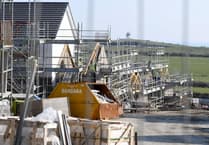The Attorney General’s chambers insists there is no evidence of emails being tampered with in a multi-million-pound civil claim being brought against two government departments.
Development company Sondica Group Inc is seeking damages of between £50m to £90m in relation to its ultimately unsuccessful bid to redevelop the North Quay site in Douglas.
No trial date has been set in Sondica’s long-running case against the Department of Infrastructure, the Treasury and London-based consultants Lambert Smith Hampton (LSH).
Sondica has applied for a specific disclosure order relating to documents it said that the two government departments had failed to disclose.
Its advocate Vicki Unsworth referred to a schedule of 25 documents she said was still outstanding including minutes of meetings in 2016 and 2017 which the government said could not be found.
Deemster Andrew Corlett said: ‘I can’t understand why any organisation would lose [meeting] minutes - particularly in a case where a legal claim is intimated.
‘There no suggestion that the meeting did not take place but there’s no minutes.’
Lawyer acting for the Attorney General, Josh Quinn, said that if the claimant wanted further explanation they could write to the AG’s Chambers - a suggestion the Deemster described as ‘not desperately helpful’.
Mr Quinn insisted: ‘The government defendants, albeit slowly, are trying to move this matter forward.’
He said there had already been extensive disclosure with no fewer than 1,168 documents disclosed.
Mr Quinn said of the 25 documents listed some had already been released, others were outside the scope of the order or covered by privilege, and others could not be found.
Sondica, which is claiming negligent misstatement and misfeasance in public office, also allege that emails had been tampered with.
Ms Unsworth had given the example of an email produced by government which ‘stopped in mid-air’ but the same email, as supplied by LSH, had ‘a whole host of additional words’.
But Mr Quinn said an investigation by Government Transformation Services found there were technical reasons for the discrepancies. In one case a ‘less than’ sign in the code used to open a tag had been misread by the system, and in the other a draft email had never been received.
‘There is no evidence of tampering,’ he told the court.
The dispute dates back to early 2015 when the DoI invited expressions of interest in the development of land on Lord Street which included the former bus station site.
Douglas-based Sondica, acting as part of a consortium, put together a tender for a £55m investment which included a hotel, a four-screen cinema, restaurant, Winter Gardens, new bus station facilities, a multi-storey car park, nine apartments, office space and small retail units.
It was initially told it had been chosen as the preferred developer from a shortlist of three.
But then in March 2016, the Chief Minister’s regeneration steering group rejected its tender bid and decided to start a new tendering process.
Kane Limited, which submitted an offer of £600,000, far below Sondica’s initial one of £4.1m, went on to secure the tender.
.jpeg?width=752&height=500&crop=752:500)
-(2).jpeg?width=209&height=140&crop=209:145,smart&quality=75)


